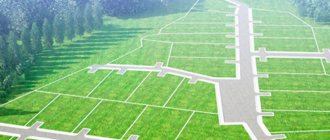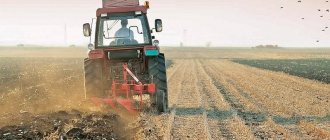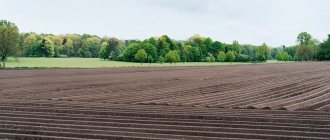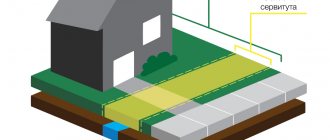Not everyone knows what private household plots and individual housing construction lands are, and what the difference is between them. Legislation divides land into different categories depending on its intended purpose. Therefore, the owner, before construction or sowing work, must find out whether the site is suitable for this and how individual housing construction differs from private household plots.
What's special about private farms?
The definition and features of private household plots are enshrined in the federal legislative act “On personal subsidiary farming” of July 7, 2003. What is LPH? This is the name given to a special type of economic activity when a citizen is engaged in agriculture on his own or leased territory, but not for business purposes, but for personal needs.
But what does this give? What the owner of the plot grows, he does not sell, but uses it himself, for the needs of his family. This is a kind of way to replenish the family budget, but not at the expense of finances, but in kind.
Another important question that you should ask before registering a private plot is what taxes await the owner of the plot . Due to the fact that this is not a business activity, there is no need to pay income tax in cash or in kind. The only tax that the state requires from owners of private household plots is land tax, in the amount of 0.3 percent of the cadastral value of the plot per year, that is, very little.
But in the event that the owner of the farm decides to sell surplus production, income tax must be paid on the income from the sale. However, this is a theory. In practice, there are usually either no surpluses at all, or their quantity is insignificant and the owner sells them inexpensively to his friends.
This concept should not be confused with “peasant farming ,” which is a type of entrepreneurship and is therefore subject to other taxes, including on profits. Owners of private household plots also do not have the right to hire employees; all work on the site is carried out only on their own.
Personal subsidiary farming is a way to replenish the family budget not at the expense of finances, but in kind.
How justified is it to invest in such a business?
I'll give an example of my friends. They have a small mini-farm of 8 heads of cattle (cows), 4 adult pigs and 7 piglets, 30 chickens, 15 rabbits, as well as purebred German shepherds for sale of puppies. There are 5 people in the family. 2 adults, 3 children (25, 22 and 10 years old). The head of the family is a livestock specialist by training.
Adults and children are involved in the work. The main income is the sale of dairy products: cheeses, feta cheese, cottage cheese, sour cream, butter. They also sell eggs, fresh pork, and rabbit. Place of sale: a trading place in the city market, rented jointly with other “mini-farmers”.
If the volume of dairy products produced by their farm decreases, they buy additional milk from local residents. This mini-business gives the family a stable income and allows them to live in abundance. Its profitability is obvious.
To confirm my opinion, another story about a mini-business in the countryside:
Opening a business based on your own personal plot is a great idea for entrepreneurs who do not have much initial capital and want to organize a business from scratch.
This is a chance to try your hand at the agricultural industry and decide for sure whether it’s for me or not. In 2020, the import substitution program continues to operate, thanks to which the agricultural industry opens up new opportunities for aspiring businessmen and investors.
Since 2020, the volume of Russia's own agricultural products has increased significantly.
Business in rural areas attracts not only those who hope to get rich from their backyard, but also those who are ready to invest in this industry and see prospects in it. The decision to create a personal subsidiary plot using your own plot is the starting point in this direction of business. Go for it!
Question to readers:
Is there a future for this form of business?
Do you have a personal subsidiary plot (LPH) where you grow vegetables, poultry or cattle for your own consumption? Do you sometimes have a surplus of produce and sell it to your neighbors or at the local market? Turn your farm into a profitable business!
In this article I will tell you about a business plan for private household plots, the rules for its preparation and implementation, and I will give examples.
Does the state limit the area of household plots?
The area of the personal plot should not exceed half a hectare (it is believed that this is sufficient for the needs of one family). But regional authorities have the right to increase the permissible size of plots by a special legislative decision by a maximum of 5 times (that is, up to 2.5 hectares). Therefore, when planning to create private household plots, study regional laws in this area .
What categories of the population can receive territories for personal gardening?
When you are thinking about how to open a private household plot from scratch, the most important question is where to get the land. When a person owns land, registration of a private plot is not required - in fact, he can begin agricultural work at any time.
But if you don’t own a plot of land, but you need to run a private plot? There is a way out, and it’s quite simple and without financial investments at the first stage. In this case, you need to write an application to the local municipal authority (administration of the city, district, rural settlement) about the desire to run private household plots and a request to allocate a plot of land for this.
Surprisingly, the answer is likely to be yes. This is explained by the conclusion that in most regions of Russia there is enough free land that is quite suitable for rural work . It is much more profitable for the authorities to transfer this land to the owner of the private household plot and receive a tax from it (land tax, by the way, is local, that is, goes directly to the municipal budget) than to have no profit from it at all for many years.
Sometimes authorities even conduct special programs to inform citizens about the possibility of allocating land for private household plots and provide the opportunity to receive a subsidy for certain types of activities.
In this regard, it is even much easier for rural residents, because they are required to have plots of land, both within the boundaries of the settlement (near their place of residence) and beyond. City residents receive household plots for agriculture only if there are vacancies.
Land plots are mandatory for rural residents
Private household plots and individual housing construction - what is the difference?
Private household plots differ from individual housing construction by the main characteristic of the land plot - the type of permitted use. Despite the fact that both statuses of land plots allow you to build a house, their fundamental difference is in their purpose. The intended purpose of private household plots is to conduct economic activities in animal husbandry or crop production. On land of this category, building a house is possible, but not mandatory.
A plot of individual housing construction is allocated for the construction of a residential building. No one will forbid setting up a couple of beds or a flower garden in the local area, but limited space, sanitary standards and legislation will not allow building a barn for keeping livestock.
In both cases (LPH and individual housing construction), the use of land beyond its intended purpose can lead to its seizure. The state has established a three-year period for the exercise of owner rights.
The main differences between private household plots and individual housing construction:
- Tax. The tax rate on individual housing construction is higher than on the field plot of private household plots. The tax rate for a personal plot differs from individual housing construction by tenths of a percentage rate, very slightly.
- Type of permitted use.
Individual housing construction and private subsidiary plots have in common their non-commercial purpose, which prohibits the conduct of production or farming activities on these land plots, or the use of hired labor.
Is registration of a land plot enough for comfortable farming?
There are 3 options for providing land for private household plots:
- permanent use for a fee for an unlimited period (the most unprofitable option);
- rent, up to 20 years;
- free use, up to 6 years.
On the one hand, after the land has been allocated, work can begin. But on the other hand, in such a situation the citizen has no confidence that the plot will not be taken away from him after some time. Therefore, a reasonable step would be to register ownership of the site . Obviously, this is not an easy path, but at the same time, it is not as difficult as it seems at first glance.
Is there a way to register the area of land as property?
How to register a plot as property? To do this, you will have to take several important actions and be prepared to have a lot of contact with government agencies. Let's look at the sequential steps of the owner of a private household plot to obtain a certificate of ownership of a land plot and evaluate how realistic it is to acquire your own land.
Certain groups of Russians have advantages when obtaining land plots for private household plots. This:
- young families who do not have their own housing (subject to an officially registered marriage);
- large families with 3 or more children;
- holders of the highest state titles.
Other citizens, before receiving land for personal farming, will have to go through a series of bureaucratic procedures and wait several years.
To register a plot as property, you need to be prepared to have a lot of contact with government agencies.
What steps do you need to take to register a plot?
So, step-by-step instructions for obtaining a certificate of land ownership :
- Issuance of a resolution on the allocation of a land plot for the needs of private household plots. This is done by local authorities. This is the first document, the possession of which the owner can begin agricultural work. The act will most likely indicate the period for which the land is provided, and also indicate the possibility of extending the rights of use. In each region, the procedure for providing land is different and may change from year to year. It is impossible to say unambiguously for what period the land will be provided. That’s why it’s so important to move on to the next steps and seek ownership rights. Otherwise, you may find yourself in a situation where trees and several crops grow on your site, and the local administration decides to sell the area for development.
- Registration of a cadastral passport and an order on established boundaries. This can be done in several ways. For example, contact the representative office of the Cadastral Board (in person) or the Rosreestr website (via the Internet). After filling out the application and paying the fee, after some time the owner will receive an extract from the register and a cadastral passport. You can also resort to the services of law firms specializing in land issues and order the registration of a cadastral passport named after. This will cost significantly more, but it guarantees a faster result and eliminates the need to communicate with the authorities.
- Submitting an application for state registration of homestead territory and obtaining a certificate of land ownership. The institution issuing these certificates is Rosreestr. The package of papers will need to be accompanied by acts confirming the conclusion of ownership rights to the plots.
Nuances of registering personal subsidiary plots
A very important requirement for recipients of land for the needs of private household plots and subsequent registration of its ownership is the intended use. That is, on land allocated for private household plots, you can only engage in agriculture to meet the needs of the family. You cannot obtain land for private household plots and then build a shopping center there.
Regulatory authorities usually check the intended use of the site, but otherwise do not bother the owners. The law prohibits any interference in the activities of such farms, and therefore you are absolutely free to choose methods and directions of management. You can engage in farming, poultry and livestock farming, gardening and even beekeeping.
Another important advantage of private household plots is the availability of government support . If possible, regional and local authorities ensure the development of infrastructure in the territories, subsidize certain types of work, organize special educational events and preventive veterinary examinations.
An important advantage of private household plots is the availability of government support
Download business plan
This document is the starting point from which you need to start building your business.
It reflects all aspects of the work: from a description of the business idea to detailed “instructions” for its implementation, that is, an economic, calendar and marketing plan, as well as the financial part, including start-up and operating costs, projected profits and expected payback periods for the project.
We have prepared for you a sample of a ready-made business plan for a mini-farm for raising pigs on the basis of private household plots. You can download it for free. Keep in mind that any business plan from the Internet is a template. It needs to be properly adapted to the conditions in which you are opening your business.
To conclude the topic of the video about the profitability of livestock and poultry farming in private household plots:
Own 15-20 acres of land or a small rented plot for private household plots is a good basis for starting a mini-business in the agricultural industry.
A good way to get started is subsidies from the state, preferential loans for the purchase of equipment, feed or young animals, but these “benefits” are not given to all businessmen, but only to some, subject to certain conditions.
How to achieve success and get help from the state? Implement business planning, prove your competence and ability to correctly allocate funds, find ways to sell products.
Does the law prohibit the construction of buildings on the territories of subsidiary plots?
The federal law on personal subsidiary plots stipulates the right of plot owners to use personal plots not only for agriculture, but also for the construction of a residential building (and commercial buildings).
You can build a house without changing the category of the plot , therefore there is no need to coordinate with the authorities the transfer of land from the category of private household plots to individual housing construction (individual housing construction). When building a house, you must comply with all building codes and safety requirements.
An important condition for construction is the following. The construction of a house will be legal only if the site is located inside a populated area. If the land is allocated outside the settlement, for example, in a field, a house cannot be built.
How to register a house on a private plot? Before you start building a house, you need to obtain the appropriate permit. It is most convenient to submit an application for construction permission at the multifunctional center. It must be accompanied by documents confirming property rights, a site layout plan, and a schematic plan for the location of the future building. Work can begin after receiving a positive decision from the municipal authorities.
After completion of construction work, you will have to write an application again for permission to put the house into operation. A professional commission will inspect the site, the new building and, provided that all standards are met, issue a permit.
The final step will be registering ownership of the new home. This is done by Rosreestr, but you can also submit documents through the multifunctional center. To do this you need:
- statement;
- permission to put the house into operation;
- confirmation of property rights to the site;
- technical documentation and receipt of payment of the duty.
In addition to a residential building, it is completely legal to build bathhouse complexes, greenhouses and hotbeds, wells, cellars and warehouses and any other premises for domestic and economic needs on the site.
Is it possible to build a residential building on the lands of private household plots?
I bought a plot with a built house, but I completed some things on it myself: greenhouses, a bathhouse, a workshop. To avoid misunderstandings with a building permit, I had to study the legislation in detail, and at the same time found out whether it was possible to build a house on the lands of private household plots. Briefly about the most important things.
A plot of land for private plots can only fall into two categories:
- Land for a personal plot within a populated area. On a private plot of land, you can build a residential building and any other buildings (subject to the rules that are the same for everyone - construction, fire safety, sanitary and hygienic and others, and you can also produce agricultural products (any kind: planting plants, raising animals and poultry, setting up an apiary) In a residential building built on a private plot of land, you can register at your place of residence, and it is also possible to receive a property tax deduction.
- Field land for growing crops. On a field plot of land, you can only produce agricultural products and erect non-permanent buildings for this purpose (without a foundation). It is prohibited to build a residential building, and if it is built, it may be forced to demolish it. Naturally, there is no question of registration in such a house.








